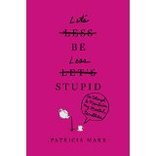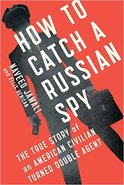I usually have a book or a blog of the week, and I had a candidate for a book this week but then realized that I just didn’t want to finish it. I had bogged down in it. No problem, I thought. I had some others. But I couldn’t seem to finish them either. Others might like them, though, and if nothing else I can share with you the core idea I got from each one. Here goes:

Marx is a comedy writer and novelist, having worked for Saturday Night Live and the Harvard Lampoon. She decided to attempt a rescue of her intelligence by exploring a number of ways to enhance it, including learning Cherokee and playing online games. She’s very funny. I laughed out loud several times during the first couple of chapters. But then . . . it stopped being so funny. Too much of the same thing. Plus there’s a fair amount of that awful writing that looks like someone’s printed handwriting but of course isn’t, mostly explaining drawings that are pretty bad, which I can’t read. Not very well, anyway. It’s too small and too squiggly. I just can’t be bothered. (This lack of interest also applies to graphic novels.) Reading the e-book version would help the small-print problem but not the uninterested problem. (Please note that I did not say “disinterested,” which means something quite different.)
I did gain the insight that most if not all of the so-called “brain training” tools available out there are pure hokum, but we all knew that anyway, didn’t we? So we can relax.

You may remember that some time ago I wrote a post about Laura Doyle’s book The Surrendered Wife. One of her points is that marriage counseling is almost always harmful to a marriage, primarily because the couple is encouraged to share problems about each other and the marriage to a third party, which does nothing but rile them up. (The couple, that is, but also the problems.) Her latest book, First, Kill All the Marriage Counselors, re-emphasizes that point. I don’t agree with everything she says, by a long stretch, but I do think she’s right about this. If I tell my husband that I love him after the counselor told me to do so, why would he believe me?
Anyway, Weil decided, partly as a journalistic enterprise but mainly as a marriage-improvement exercise, to devote a year to trying out the various therapies out there that claim to make this most important relationship better, although what “better” means is open to interpretation. As Weil points out, “Marriage researchers not selling marriage books, workshops, DVDs, or counseling admit to knowing surprisingly little.” She points out, for example, that many researchers dispute John Gottman’s findings in his “Love Lab,” in which he says that he can tell with 96% accuracy whether or not a couple will divorce based on his viewing of a five-minute video of a conversation between them. I quoted Gottman in my own book and also talked about him in my review of Blink by Malcolm Gladwell. Have to say that I pretty much swallowed the whole thing, but maybe I shouldn’t be so quick to fear for my marriage if I roll my eyes. On the other hand, eye-rolling is pretty rude and I shouldn’t do it anyway.
I ground to a halt somewhere about halfway through this book, mainly because the issues in Weil’s marriage, and the personality of her husband, were so wildly different from anything that I’ve experienced that I had a hard time relating to it. Also, I just get very bored and irritated with people who can’t express themselves without dropping f-bombs all over the place. (She doesn’t do that, but her husband sure does.) So I quit. Main lesson learned? I’m so grateful for my own husband, but I’ve also gotten an honest peek into someone else’s marriage, one I could never survive, but which nevertheless is based on love, affection, and attraction.
And I have to include the following quotation, from Dan the husband, which, although he certainly didn’t mean it this way, is one of the best arguments I’ve ever heard from a non-biblical source for saving sex for marriage and for perhaps substituting a little more intentional courtship for your unintentional dating: “I mean, I always meet someone. I go out on a date. I go on another date, and it’s like every time you sleep together you’re sewing another little stitch between your hearts, so that even if you never meant to get in a big relationship, it makes this big, bloody mess when you rip them apart, which you always do.”
And, finally:

How to Catch a Russian Spy: The True Story of an American Civilian Turned Double Agent by Naveed Jamali and Ellis Henican, Scribner: 2015.
Let me ask you something: Why was there no discussion about whether Dylann Roof, the Charleston shooter, had been “radicalized”? Why was he never called a “homegrown terrorist”? And yet speculation has been rife about whether or not Mohammad Youssef Abdulazeez, the Chatanooga shooter, had been radicalized during his visits to relatives in the Middle East. “Terrorist links” are suspected. What’s the difference between a white supremacist and a Muslim extremist? There isn’t one. They both have the same mindset: that it’s okay to kill people who don’t agree with you, who are different from you.
All that is to say that this book is about an American patriot with a Pakistani last name who was absolutely determined to serve his country. Among many quotations I could give, here’s one: “Nine-eleven had not only inspired patriotism. It had reminded a lot of people that there were opportunities to do something worthwhile. The more I thought about it, the more I knew: There had to be something larger and more meaningful I could do. That was when I came up with the idea of joining Naval Intelligence.” Jamali tries several times to do just that; when he’s initially unsuccessful he comes up with another idea: becoming a double agent by feeding information to a Russian diplomat/spy who patronizes his parents’ book and resource store. (It’s complicated.) And he succeeds. I thoroughly enjoyed the first part of this book, but I got bored with the day-to-day procedures of setting up the sting. In the end, Jamali succeeds in fooling an experienced Russian military-intelligence officer and exposing espionage activities at the Russian Mission to the United Nations. He’s now doing what he dreamed of before all this happened: he’s a reserve intelligence officer in the U.S. Navy.
If you think you’d enjoy the minutia of intelligence operations, this book might be for you. I think I may wait for the movie to come out, which is apparently in the works.